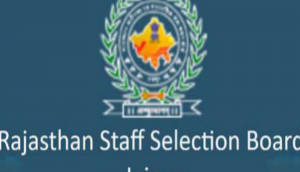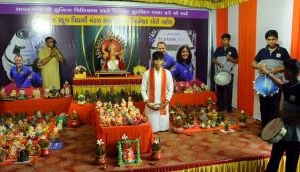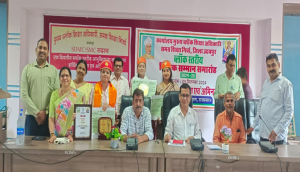
It is 8:30 am on a Friday. Two teachers - a man and a woman - enter a noisy classroom on the first floor of a government school building. A small group of students, all between 10 to 14 years of age, clamber up on their feet. "Goood mooorningg ma'aaaam," the students say in a long, drawn-out drawl.
One of the teachers, Jitendra Ahlawat, a contractual employee, doesn't mind the gender discrimination. He smiles and greets the students.
The other teacher, Vandana Jha, quickly sorts the class of 40 students in to eight groups of five members each. First, the students are allotted names of fruits/vegetables and random numbers. Next, they are asked to run to a corner of the room, when a certain number is called out.
Chaos ensues. Students are clueless about which numbers correspond to which vegetable. The teachers try to guide them with patience, albeit quite unsuccessfully. And yet, all the kids are laughing and running with joy. Soon, they busy themselves with yet another activity, one with a relatively better outcome.
Also Read: AAP government's second Mega PTM: A fresh report card
"We're trying to teach them by play-way methods. It piques their interest and the children tend to learn their lessons effectively," says Dr H Akhtar, Vice-Principal of Sarvodaya Vidyala, Jor Bagh.
"Little children need to play, not study. Learning is different from studying. There should be no force on them. They should be able to choose what they want - study or play. Learning can happen through story telling, programmes and various other activities," Venita Kaul, Director of Centre for Early Childhood Education and Development (CECED) at Ambedkar University Delhi (AUD) tells Catch.
All the 40 children have been handpicked by the school to be a part of a special class. A class that will help these children learn how to read their grade-level Hindi textbooks.
'Every Child Can Read'
The following points came to light during a recent baseline assessment test of all children studying Hindi in classes 6 to 9 in Delhi government schools:
74% could not read a paragraph from their own textbook.
46% could not read a simple story of Standard 2 level competency.
8% could not identify letters.
In June 2016, the AAP government launched the Chunauti 2018 academic plan, aimed at helping students reach their grade-level academic competence.
Also read: AAP govt's latest reform: no child to be left behind in Class IX
On 9 September, the government rolled out its '100% Ability to Read' plan. Its objective? To ensure that all children studying in classes 6 to 8 would be able to 'read with comprehension' by Children's Day, 14 November 2016.
"The programme is targeted at these kids who are not able to read textbooks. These non-readers, later lose interest in studies and drop-out of school in Class 9, once the no-detention policy is removed," says Dr Akhtar.
To achieve this, all government schools first identified non-reader students in classes 6 to 9. A special teacher was assigned to every set of 30 non-readers. An hour a day is set aside, mostly during zero period or assembly time, where these children focus on reading-based activities.
"During this time, we break up the basics. Teachers choose their own methodology to teach. The state directorate sends reading materials to schools on daily and weekly basis such as cue cards which consists recommendations for activities," says Mrs Vinita, Head of School, Sarvodaya Vidyalaya- Jor Bagh.
The Roadblocks
"There are around 50 students in this reading class. Initially, 41 were selected. But some more kids wanted to be a part of it. So we included them," says Dr Akhtar.
However, executing the plan was not easy.
"Initially, some parents were angry. 'Why have the sections been changed?' they would ask. It was difficult to explain. Parents don't want to hear about the shortcomings of their children. The involvement of School Management Committee (SMC) committee, SMSs sent by the school and parent-teacher meeting helped," he adds.
Also Read: AAP is working to improve government school education. With feedback from 1 teacher at a time
This group of children have also been split up into smaller groups according to word-level and paragraph-level reading skills. As the class progresses, each group is handed an item and is asked to write five lines on it (in Hindi) within a stipulated time period.
A table of five boys gets a pink-coloured toy elephant. They quickly write five lines about the elephant in Hindi. Realising they are the first group to finish the activity, the boys break into a Yo Yo Honey Singh song.
At another table, lies an toy iron. The group - two boys and three girls - struggle to complete five lines on the iron. Among them sit Nitish, who suggests the fourth quality of iron. His family migrated from Bihar about five years ago. "Papa pally supply karten hain (Dad supplies ply)," he later tells us. Sandhya, the daughter of a cab-driver, chips in with the fifth line. The group disagrees and breaks into a quarrel. The teacher, Ahlawat, rushes forward to help them.
As we move around in the class, we realise that quite a few children are dyslexic and confuse letters and words while writing.
"We're aware of this issue," an official from Delhi Government's education department admits."
We'll are coming up with a plan to deal with this. For instance, the exams could be different for these children. The teaching process will be different," adds the officer.
Also Read: In Delhi's govt schools, kids soak in summer camps, thanks to AAP
Action Plan
Since July 2016, the Delhi government has introduced a series of educational reforms. Their mega PTM, teacher training and summer camp initiatives have been in news over the past few months.
Currently, along with their 100% reading challenge, 'Reading Melas' have also been introduced, where children, parents and the entire community sit down to enjoy reading.
The government has also initiated a student adoption method, where teachers go out of their way to help students catch up with their classwork. Last month, Deputy Chief Minister Manish Sisodia also announced the government's decision to open pre-schools for young kids.
Also Read: AAP to launch 10 preschools soon; Here's a look at Delhi govt's ambitious 3000 Early Learning
Teachers too, in an effort to boost the learnings, have their own Whatsapp group where they exchange and share ideas and discuss problems. They have also been attending the training workshops, organised by the government.
More education initiatives are expected to be announced over the next few months. However, with no immediate results in sight, a few principals that Catch spoke to feel that Chunauti 2018 is going to be a difficult challenge.
"Years of stagnant education system will take time to come into motion. Earlier, no one thought about these government students. There is some hope now," admits Dr Akhtar, as he walks back into the class.
First published: 2 November 2016, 6:29 IST






![BJP's Kapil Mishra recreates Shankar Mahadevan’s ‘Breathless’ song to highlight Delhi pollution [WATCH] BJP's Kapil Mishra recreates Shankar Mahadevan’s ‘Breathless’ song to highlight Delhi pollution [WATCH]](https://images.catchnews.com/upload/2022/11/03/kapil-mishra_240884_300x172.png)

![Anupam Kher shares pictures of his toned body on 67th birthday [MUST SEE] Anupam Kher shares pictures of his toned body on 67th birthday [MUST SEE]](https://images.catchnews.com/upload/2022/03/07/Anupam_kher_231145_300x172.jpg)






